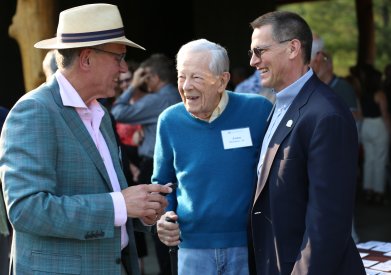Developing Relationships and Connections
July 23, 2019
This is the seventh Trust Practice Challenge winner to be featured in this letter. It was one of eight outstanding submissions we are showcasing at the annual Foundation Forum in August.
We all can relate to going to a new school or entering college and feeling disconnected, disoriented and lonely. At The Johns Hopkins School of Medicine (JHSOM), a medical student in a 2004 student survey lamented, “I just want someone to know me here.” That comment became the rallying call to improve relational connections in the learning environment between students and faculty at the medical school.
Since its beginning in 2005, Robert Shochet, MD, has led the College Advisory Program (CAP), a framework for developing deep community connections. He is an internist with fellowship training in consultation psychiatry, communication skills trainer, and former leader in the Academy on Communication in Healthcare. Dr. Shochet has a wonderful mix of competencies, but he is not the only expert in human relationships. The skills he helps other develop can be replicated.
The trust practice submission for CAP tells us how the learning community is organized: Each incoming class (120 students) is randomly sorted into groups of 30, and assigned to one of four advisory colleges. Once in a college, students are subdivided into learning units of five, and a unit, referred to as a “molecule,” is paired with a CAP faculty advisor. The 24 molecules of each entering class form the learning teams for an immersive 16-week first-year course, Clinical Foundations of Medicine (CFM). The course covers communication skills, history and exam skills, and professionalism, with emphasis on team process and reflective practice. Once CFM ends, student-advisor and molecule continuity still continues. Over the four years of medical school, these units meet quarterly for advisor-facilitated small group discussions to reflect on their journeys and emergent roles and identities, and students meet regularly with the longitudinal advisor for career planning and support.
The CAP’s goals are to develop a supporting, safe space to explore relationships, personal well-being and promote humanism through a commitment to caring attitudes and personalized support for each student in their professionalism formation. A published study regarding the JHSOM student experience in the CAP found that students reported higher quality advising, an enhanced sense of community, and better social integration compared to a graduating cohort that had not participated in the learning community.
Why is a supportive structure like CAP considered a trust practice?
- When we feel socially isolated, we are less trusting of others and our cognitive bandwidth is impaired by these feelings; the CAP offers a social scaffolding to engage each member in the educational enterprise.
- Relationships are the core of trust and without them medical students, resident and practicing physicians have less humanistic qualities, including compassion and communication skills.
- The signal from faculty and the medical school to its students is that they care about them; when I know you care, I can trust you.
- When faculty and students are in continuous and supportive relationships, vulnerabilities can be shared, deep learning can occur, and students are inspired to courageously pursue their dreams.
- The competencies needed to build trusting relationships and community are active listening, open-ended non-judgment questions, appreciative inquiry, and continuity.

Daniel B. Wolfson
EVP & COO, ABIM Foundation


